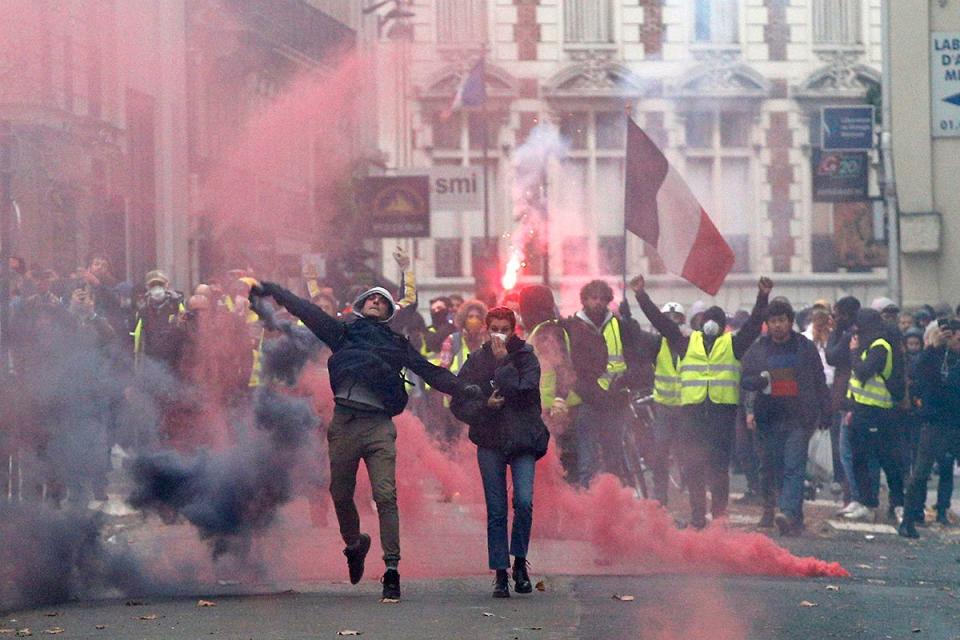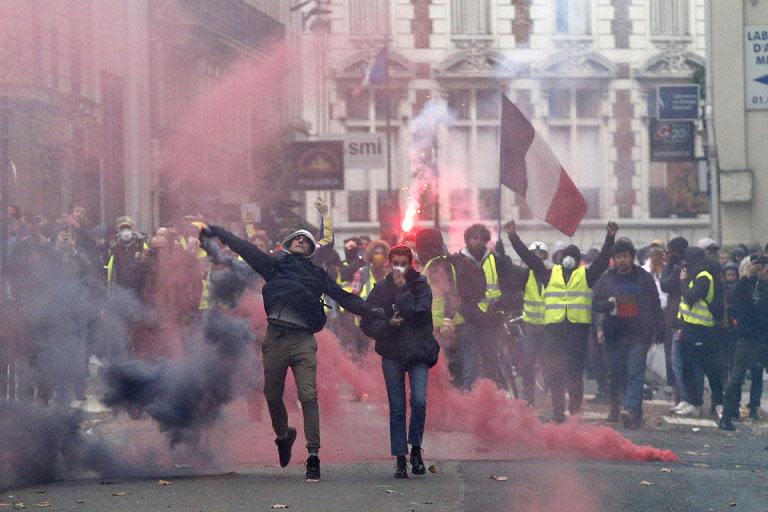The 'gilets jaunes' protests suggest an uncomfortable truth about Macron and everyone who believed in him
Theresa May is having a tough old time of it. Still, in the last few weeks she might have occasionally glanced across the Channel and felt for Emmanuel Macron. The angry “cheveux blancs” on her backbenches is nothing compared to the “gilets jaunes” which Macron faces across the barricades.
Indeed, while May has recently seen her approval ratings rise (admittedly from a low base and probably just temporarily), the French president has seen his plummet: just 23 per cent of respondents in a recent poll had confidence in his leadership. What’s more, a large majority think he will be unable to complete his planned economic reforms in the face of continued violence.
So what will the man we must not call “Manu” do? He has already agreed to row back on proposed fuel tax increases but so far that has done little to restore order, with the protest movement having seemingly become a much broader ideological battleground: on it, Macron’s hopes of transforming the French economy may die.
All this seems a long way from the president’s moment of electoral triumph in May of last year, when he and his new political movement, En Marche!, swept to victory over both traditional centrist parties and the extremist option offered by Marine Le Pen.
Back then, Macron’s pro-business message and his ideas for modernising the economy appeared to have struck a chord. Sure enough, in his first year in office, he moved quickly to inject dynamism into French industry, reducing state intervention, making the labour market more flexible and seeking to overhaul the education system. Previous governments have regularly talked up the need for such reforms yet failed to carry them out. Macron appeared to have changed the pattern of recent French history.
But the protests of the last month tell a different story.
For one thing, they are a reminder that the strength of the protest tradition in France will not wane as easily as all that and cannot be controlled by the personality of any single politician. It has been one of the hallmarks of the recent street demonstrations that they are not defined by the policy programmes of political parties, nor led by political figures. Any who have tried to capture the protests for their own ends have been told to continuez tout droit.
What the violent scenes have also shown perhaps is that Macron’s erstwhile popularity was something of a chimera, casting a temporary veil over the malaise that has beset French politics since the Mitterand era – an age which paradoxically weakened the country’s constitutional checks and balances, while at the same time embedding notions about the rights of the people (Mitterand was, after all, a socialist – of sorts).
Macron looked for a moment as if he had broken the shackles of the past, tapping into anti-establishment anger while concurrently promising a positive vision of a modernised France taking a lead in the globalised world. But was he simply the least of all evils?
Even at the time of his astonishing rise to power, many queried how an ex-banker, who had taken a senior role in President Hollande’s staff in 2012 and who had been minister of economy and finance for a year from 2014, could possibly be the fresh new voice he claimed to be. Sure enough in the first round of voting, the electorate was split. Macron, who had benefited from facing rivals who were either dull, scandal-hit or extreme, still won just a quarter of a vote.
Luckily for him, Le Pen came second, meaning that victory in the second round run-off was more or less guaranteed. Macron’s novelty, his positivity and his message of a hopeful future were held out as signs of a national political re-awakening: yet for a great many people, his policies in practice have done nothing more than confirm their suspicions about the political class.
The anger about declining living standards which has fuelled the “gilets jaunes” protests does not appear to be abating; and it remains to be seen whether Macron – whose populist credentials, if they were ever more than photo-opportunity deep, have plainly deserted him – can calm the streets without undoing his reformist agenda in toto.
If he fails, the uncomfortable question for France (and perhaps for Europe as a whole) is “what next”?

 Yahoo News
Yahoo News 

